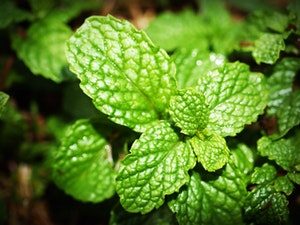Menthol is a compound that is used across many industries from confectionary to pharmaceutical products. Its popularity and range of applications stems from its activation of cold-sensitive human tissue receptors. There are both natural and synthetic sources of menthol available today, with synthetic menthol expected to see increasing market growth.
 Menthol is found naturally contained in mint and peppermint oils but can also be produced through a variety of synthetic routes. It has three chiral centers giving rise to several different stereoisomeric forms. The most common form found in nature is (-)-menthol.
Menthol is found naturally contained in mint and peppermint oils but can also be produced through a variety of synthetic routes. It has three chiral centers giving rise to several different stereoisomeric forms. The most common form found in nature is (-)-menthol.
There are various routes to synthetic menthol with reagents in plentiful supply, and this makes the synthetic option more financially attractive compared with the natural sources that are sensitive to weather and seasonal fluctuations. One such synthetic route is using the petrochemical m-cresol. Many of the major corporations supplying synthetic menthol have their own synthesis routes.
Economically motivated adulteration is a serious issue in the natural product industry, with the low price and plentiful supply of petrochemical-derived reagents giving significant temptation to use synthetic versions of natural products. When there is concern over the potential presence petrochemical-derived menthol in natural menthol products, carbon-14 analysis offers a quick and accurate testing method to check for this.
Carbon-14 is a weakly radioactive isotope of carbon and is present at a known level in all living organisms. Fossil fuels and their derived materials are sufficiently old to be devoid of carbon-14. Measuring the carbon-14 content of natural products is an accurate way to determine if they have been adulterated with any petrochemical-derived synthetic materials. Not being able to back up and authenticate “natural” claims can have both legal and financial consequences. Carbon-14 testing can be part of a robust quality control program to screen for petrochemical-derived adulterants.
Beta Analytic is an ISO 17025-accredited laboratory that provides accurate and fast carbon-14 natural product testing. Results can be accessed online 24/7. Expert technical support is available at no additional cost at any point before, during or after submission. For inquiries on prices or turnaround time, please call 305-662-7760 or use the lab’s contact form.
References:
American Chemical Society. “Molecule of the Week Archive: (-)-Menthol” 2016. (Accessed December 2018).
Chemistry LibreTexts. 6: Strategies in (-)-Menthol Synthesis. [updated 2015]. (Accessed December 2018).
Persistence Market Research. “Synthetic Menthol Market: Global Industry Analysis and Forecast 2017 – 2025” [date unknown]. (Accessed December 2018).
This entry was posted on Monday, January 7th, 2019 and is filed under Essential Oil Testing, Flavor & Fragrance, Flavors Carbon-14 Analysis, Natural Product Testing .